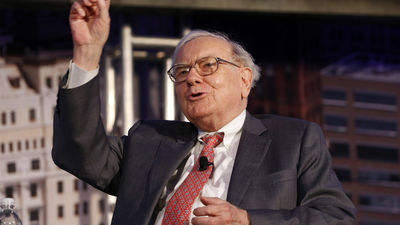There are three qualities that define his investment strategy. Could you adopt them?
Much of the financial world is all abuzz over the 50th annual letter to shareholders of Berkshire Hathaway, released this past weekend. Financial journalists, amateur Buffett sleuths, Graham & Dodd aficionados and just about everyone I know spent some quality time this weekend with this letter. They are all trying to identify that one pearl of wisdom that will give them that special insight to allow them to “invest like Warren.”
Let me save you some time: No, you are not Warren Buffett. And, with apologies to Taylor Swift, you are never, ever, ever getting to a place where you invest like him.
Why is that? Because Buffett has many things going for him that you do not, and likely will never, ever possess. I refer not to that pile of $73 billion dollars. Rather, I refer to the secret of his skill set and abilities, which is actually not much of a secret at all.
Warren Buffett's not-so-secret-sauce is the combination of just three things, none of which I suspect you possess or deem of much importance:
No. 1. He has a deeply held philosophy that has withstood the test of time and can be summed up in a simple phrase: Value investing.
As Mr. Buffett himself has noted, he is a disciple of Columbia Business School professor Benjamin Graham. Buffett called him “my idol ever since I read his book 'The Intelligent Investor.'"
Mr. Buffett invests in undervalued companies based on their underlying fundamentals and a full reading of their balance sheets. This requires a very specialized set of skills. The vast majority of investors need to ask themselves if they possess these abilities. Merely reading a few books on value investing isn't going to make that happen.
No. 2. He is extremely disciplined.
No investing approach works always and at all times. This means that regardless of whatever your flavor of investing is, there will come a time when it will be out of favor. Indeed, there may many years when your approach will get smoked by the latest shooting star.
To stay with your approach requires that you understand it; that you recognize periods of underperformance are expected, even normal. But what separates a few from the rest is the discipline to ignore lots of noise and stick with your philosophy.
Recall the late 1990s, when tech and dot-com stocks were posting monster gains, and the Nasdaq rose 40 percent or more in some years. Mr. Buffett's value approach was out of favor, and while it didn't do terribly, it certainly wasn't scoring the sorts of returns people had come to expect. I remember hearing otherwise intelligent people saying that “Buffett has lost it; his old school approach no longer works.” Buffett was even called “a dinosaur” by some critics (See this,this and this.)
It requires a great deal of emotional discipline to not allow yourself to be knocked off of your true path. Mr. Buffett has that, as does his partner, Charlie Munger. Do you?
No. 3. His time horizons are extremely long term:
Buffett claims his holding periods are “forever.” Even if that is a slight exaggeration, his holding periods are for a very long time.
The past few decades have seen average holding periods get shorter and shorter -- and that's before we discuss high frequency and/or algo traders, whose holding periods are often measured in milliseconds.
The ability to “don't just do something, sit there” is greatly underrated. Buffett understands this, do you?
I am not suggesting that you shouldn't try to learn from Mr. Buffett or aspire to reach his level of investing greatness. Just keep in mind that he has a deeply held philosophy, discipline and time horizons that that almost no one else has.
If you pay attention to Mr. Buffett, you can discern the ingredients in his secret sauce. What makes Mr. Buffett such a brilliant investor is that he is true to himself. He has found an approach that matches his temperament, abilities, preferences and character.
If you want to be a great investor, the thing to learn from Mr. Buffett is not to try and replicate exactly what he does. It is understanding the perfect fit between him and the investing style that has come to epitomize Berkshire Hathaway. The optimal strategy that you cannot follow is vastly inferior to the sub-optimal plan you can follow.
So don't be like Warren -- be like you.
Lawrence Cunningham, a colleague of mine from grad school, was among the first to recognize the brilliance of Buffett's annual letters and essays in "The Essays of Warren Buffett: Lessons for Corporate America" back in 1998. His latest book is titled, "Berkshire Beyond Buffett: The Enduring Value of Values."







